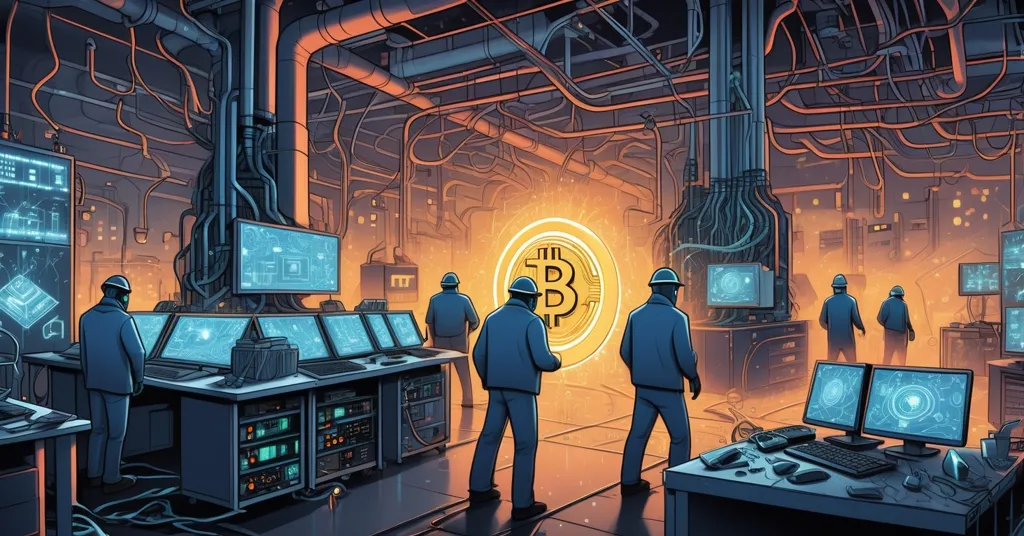TSMC 2nm Chip Theft: Major Risks for Bitcoin Mining and Blockchain Tech

TSMC Trade Secret Theft: A 2nm Chip Breach with Shockwaves for Bitcoin and Blockchain
Taiwan Semiconductor Manufacturing Co. (TSMC), the heavyweight of global chipmaking, is grappling with a bombshell trade secret theft involving its cutting-edge 2nm chip technology. This isn’t just a corporate headache—it’s a potential disruption for Bitcoin mining, blockchain infrastructure, and the decentralized tech we champion, compounded by national security red flags in Taiwan.
- Data Leak Exposed: TSMC uncovered a breach of proprietary 2nm chip technology through internal monitoring.
- Legal Crackdown: Implicated employees are fired, with two detained under Taiwan’s National Security Act.
- Crypto at Risk: Delays in 2nm chip production could hit Bitcoin mining hardware and blockchain performance hard.
The Breach: What Went Down at TSMC
TSMC, headquartered in Taiwan, isn’t just a company—it’s the beating heart of the global semiconductor supply chain, crafting chips for giants like Apple, Nvidia, and Qualcomm. Their 2nm process technology is the pinnacle of chip design, packing more transistors into less space for unprecedented speed and energy efficiency. Imagine shrinking a city’s worth of computing power into a grain of sand—that’s the leap we’re talking about. This tech powers everything from AI to the specialized ASICs (Application-Specific Integrated Circuits) that Bitcoin miners rely on to solve complex puzzles for block rewards.
So, when TSMC detected unauthorized activity leading to a leak of this critical data during routine internal checks, alarm bells rang loud. Two individuals—a former employee named Chen and a now-dismissed current employee named Wu—are detained under Taiwan’s 2022 National Security Act for allegedly violating trade secret protections tied to what the government calls “national core critical technologies.” Between July 25 and 28, 2024, Taiwan’s Ministry of Justice Investigation Bureau raided suspects’ homes and workplaces in Hsinchu City. This wasn’t a polite knock on the door—it’s a clear message that tech theft is treated as a high-stakes crime, as detailed in reports on the TSMC 2nm technology leak.
Taiwan’s Intellectual Property Division has labeled this the country’s first major criminal case involving such sensitive tech secrets, calling the suspicion “serious.” TSMC has kept the specifics under wraps while judicial review continues, but the leaked data reportedly includes key details on 2nm chip development and production. The company has terminated the implicated employees and is pursuing legal action with a zero-tolerance stance, a move highlighted in updates on TSMC’s legal actions against employees. CEO C.C. Wei has long insisted on TSMC’s unassailable position, a point echoed in their response to this crisis:
“Duplicating the company’s technologies was impossible… the complicated process requires both development and production knowledge. We will continue to strengthen our internal management and monitoring systems and work closely with relevant regulatory authorities to protect our competitive advantage and operational stability.”
Investigators are now racing to uncover the data’s intended destination and whether other players are involved. The uncertainty looms large as TSMC gears up for mass production of 2nm chips later in 2024—a timeline that could face hiccups if this breach spirals further. For more context on the investigation, check the ongoing case updates regarding Chen and Wu under Taiwan’s National Security Act.
Crypto on the Line: Bitcoin Mining and Blockchain Risks
Let’s zero in on why this matters to us in the crypto space. TSMC’s chips are the backbone of high-performance hardware driving Bitcoin mining and blockchain networks. For miners, every nanometer shaved off a chip design—moving from 3nm to 2nm—translates to a 10-15% performance boost and significant energy savings, per industry estimates. That’s the difference between profit and loss in a cutthroat race for hash rates, where miners solve mathematical puzzles to validate transactions and secure the Bitcoin network. Major players like Bitmain, a leading manufacturer of Bitcoin ASICs, depend heavily on TSMC’s output to keep rigs competitive, an issue explored in discussions on TSMC trade secret breaches and Bitcoin mining impacts.
Beyond Bitcoin, blockchain ecosystems like Ethereum, Solana, or Cardano rely on TSMC-manufactured chips in data centers for transaction processing, staking nodes, and decentralized apps. Ethereum’s shift to proof-of-stake still demands robust hardware for validators, while Solana’s high-throughput model leans on cutting-edge tech for speed. A delay in TSMC’s 2nm rollout could mean higher hardware costs, supply shortages, or stalled performance upgrades—pain points that ripple through to miners and developers alike, as noted in insights about TSMC’s role in blockchain infrastructure.
Here’s the kicker: if this stolen data lands in a competitor’s hands, it could disrupt the market balance. Imagine Samsung or a rogue actor undercutting TSMC with reverse-engineered tech, flooding the market with alternatives. While that might sound like a win for price competition, it could also destabilize supply chains for crypto hardware, leaving us scrambling. No hype, just hard reality—our decentralized dreams are tethered to a very centralized silicon fortress, with implications for cryptocurrency hardware becoming increasingly evident.
Geopolitical Stakes: Taiwan’s Tech as a National Shield
The plot thickens when you factor in geopolitics. TSMC is a national treasure for Taiwan, a small island under constant economic and military pressure from China. Taiwan views its semiconductor dominance—supplying over 60% of the world’s high-end chips—as a strategic shield, making any tech leak a potential threat to sovereignty. The 2022 National Security Act, under which the suspects are held, reflects this high-stakes mindset, treating core technologies as matters of survival, a concern amplified by the geopolitical risks of TSMC data breaches.
Speculation swirls about whether the stolen data might be headed to China, given past allegations of intellectual property theft in the tech sector. However, no hard evidence supports this in TSMC’s case, and other potential recipients—corporate rivals or black-market actors—can’t be ruled out. The lack of clarity only fuels the tension, as Taiwan doubles down on protecting its tech edge. For us in crypto, this isn’t just background noise; a shift in global tech power dynamics could indirectly choke hardware access for mining rigs and blockchain nodes if export controls or sanctions tighten.
Competitive Edge in Jeopardy: The 2nm Race
On a broader scale, the race for 2nm tech is razor-thin. Only TSMC, Samsung, Intel, and Japan’s Rapidus remain in the game, with others bowing out due to the staggering costs and mind-bending complexity of shrinking chip architecture further. TSMC has led the pack, but if this leaked data gives a rival—or worse, a state-backed entity—an unfair leg up, it could reshape the semiconductor landscape. For crypto enthusiasts, that’s not abstract; it’s the difference between affordable, efficient mining gear and being priced out of the game, a risk underscored by analysis of TSMC competitors and espionage threats.
Still, TSMC’s confidence in their unique ecosystem—spanning suppliers, expertise, and infrastructure—might hold. Replicating 2nm tech isn’t just about stealing blueprints; it’s about rebuilding a decades-long web of innovation. But let’s not be naive: determined adversaries, whether corporate spies or nation-states, have pulled off miracles before. Underestimating them would be dumb as hell, especially considering the detailed breakdown of the TSMC 2nm chip technology theft.
Devil’s Advocate: A Push for Decentralized Hardware?
Now, let’s flip the script. Could this breach be a twisted blessing for the crypto world? We’re all about disrupting centralized control here at Let’s Talk, Bitcoin, and TSMC’s stumble exposes the glaring vulnerability of relying on a single chipmaking titan for our decentralized future. Imagine if this lights a fire under the community to explore open-source chip designs or decentralized hardware manufacturing. Efforts like RISC-V, an open-source instruction set architecture, exist as a starting point, but they’re decades from matching TSMC’s scale due to funding, expertise, and production hurdles.
Effective accelerationism—pushing tech forward through bold, sometimes chaotic innovation—thrives on crises like this. A hobbled TSMC could be the kick in the pants we need to rethink our hardware dependencies. But let’s cut the bullshit: in the short term, any disruption to TSMC’s pipeline is a gut punch for Bitcoin miners and blockchain builders. True independence in silicon is a long haul, and for now, we’re praying at TSMC’s altar—irony thicker than a blockchain ledger.
As Bitcoin maximalists, we root for chaos that sparks innovation, but we can’t ignore the immediate sting. Altcoin ecosystems face unique risks too; Ethereum’s validator nodes or Solana’s high-speed infrastructure could falter without access to next-gen chips. This isn’t just a Bitcoin problem—it’s a crypto-wide wake-up call to diversify our tech stack or risk choking on a single point of failure.
Key Takeaways: How TSMC’s 2nm Chip Leak Impacts Bitcoin and Blockchain
- What does the TSMC breach mean for Bitcoin mining hardware?
Delays in 2nm chip production could stall access to energy-efficient rigs, hiking costs and slowing hash rate growth for miners. - How might blockchain infrastructure be affected by this leak?
Data centers powering Ethereum, Solana, and other networks rely on TSMC chips; disruptions could hamper scalability or performance. - Is there a national security risk tied to crypto from this incident?
Potentially—if stolen tech shifts global power dynamics, hardware access for crypto could be squeezed by tightened regulations or supply issues. - Could this drive decentralization in hardware production for crypto?
It’s a catalyst to explore alternatives to centralized chipmakers, aligning with crypto’s independence ethos, though practical solutions are far off. - Should the crypto community worry about TSMC’s dominance?
Hell yes—depending on one giant is a weak link; this breach screams the need for diversified or decentralized hardware options.
This TSMC debacle is a gut check for the fragile underpinnings of our digital revolution. For those of us obsessed with decentralization, privacy, and sticking it to centralized overlords, it’s a stark reminder that our future isn’t just written in code—it’s etched in the silicon it runs on. TSMC will likely muscle through with their deep pockets and influence, but the fallout could still bite. If you’re a miner eyeing your next upgrade or a blockchain dev banking on faster nodes, keep a close watch. True freedom means breaking every corporate chokehold, one chip at a time. No fluff, just the raw truth—we’ve got a long fight ahead.



